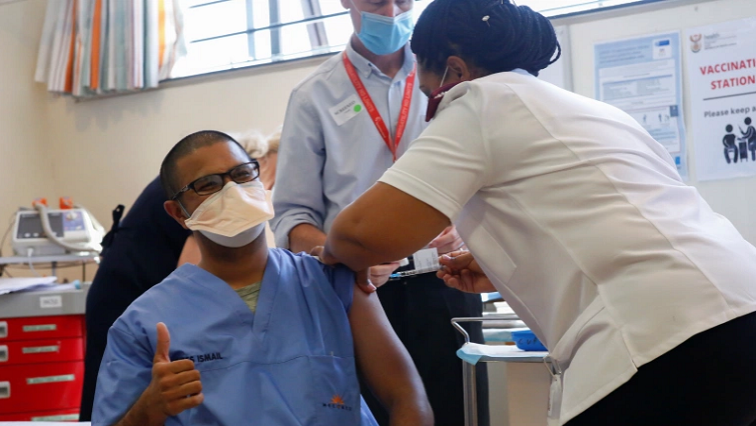Health experts are supporting government’s decision to administer the Johnson and Johnson COVID-19 vaccine to healthcare workers before it is registered.
Phaahla also revealed that the vaccines being used in the rollout were part of a batch J&J was using to conduct expanded research in terms of human trials. This led to MPs accusing government of acting unethically and lying to the public.
The vaccine proves to be 57% effective to moderate to mild diseases caused by COVID-19 and 85% effective in respect to COVID-19 diseases that are quite severe. It is effective for the treatment of the variant, 501Y.V2.
The vaccine was part of a study that involving four countries including South Africa, which conducted clinical trials on 44 000 people, of which 7000 were from the country.
In February, government administered the vaccine to healthcare workers under a clinical trial program called Sisonke, while it awaits registration by SAHPRA.
Vaccinolologist and Senior Researcher at the University of Cape Town’s Vaccines for Africa, Dr. Benjamin Kagina says, “It was a good decision and I think cleverly so. The government must be applauded for that. So remember for the Johnson and Johnson trial, they had 3 phase trials, after you get to phase 3 and you have the data, you submit that to the regulator.”
“So what the government did is that instead of the health regulator having to look at the data which can take quite some time because every single piece of information needs to be scrutinised. Johnson and Johnston was still willing to offer the South African government additional dosage as part of extended testing but this is not phase 3, this is called implementation study, so this would mean that the actual collection of more information about safety and how well the vaccine works could be collected, while the regulator is looking at data for phase 1 and 2 from Johnson and Johnson, so in that way you are able to give people or healthcare workers who are at a high risk of contracting COVID-19 a vaccine that we at least know works, minimise the delay that comes because of the natural process, lengthy process of authorisation, a product for emergency use.”
Kagina says, “It is actually a clever move by the government, if you think about it this vaccine was tested on South Africans in phase 3, so the manufacturer has data to show that the product is safe. So Johnson and Johnson has potentially given SAHPRA data but it’s not an overnight thing, there is huge detail that are contained in this data, so approval does not happen in weeks’ time, it takes time because it’s a due diligence process which requires a lot of rigorous review of data, so government looking at it as an implementation study was way to make sure that our healthcare workers are protected, perhaps the communication could have been made better so that it’s not taken as a full rollout because you don’t roll out a product before it is licensed.”
Below is the interview with Dr. Kagina:
Health emergency
Senior Post-doctoral Fellow at the University of KwaZulu-Natal’s Health, Law and Bioethics research group, Dr Marietjie Botes, says government’s decision to issue the vaccine before it is licenced is not unusual but it does not happen often.
Botes says it does happen when there is a health emergency. She says this was done to protect the healthcare workers.
“I’m glad there is such a procedure during this time of the pandemic with the raging health crisis to allow for the quick dispensing of the Johnson and Johnson vaccine.”
Government clarifies vaccination process:
INFOGRAPHIC: How vaccine licensing works

Loading…






